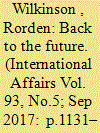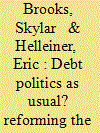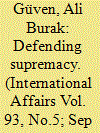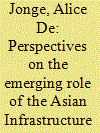| Srl | Item |
| 1 |
ID:
155479


|
|
|
|
|
| Summary/Abstract |
This article reflects on the role crises play in enabling existing systems of global economic governance to evolve and endure while also preserving underlying power dynamics. The article uses as its case-study global trade governance. Its aim is to explore the impact of the negotiating crises that beset the World Trade Organization's (WTO) Doha round of trade negotiations. The article traces how, over the course of the Doha round, periodic crises resulting from divergent pressures for opposing outcomes combined to preclude one set of institutional developments from resulting (those on which the Doha round had been launched and the basis upon which developing countries negotiated) while enabling others (those advanced by the leading industrial states). The result has been to usher in changes that have returned global trade governance to a form of system management more familiar to observers of the multilateral trading system of the 1970s. This ‘retro’ form of trade governance signals a departure from the more inclusive system that had emerged from the Uruguay round of the General Agreement on Tariffs and Trade (GATT) and evolved during the WTO's early years, replacing it with a lither system of mini-lateralism more fit for industrial country purposes.
|
|
|
|
|
|
|
|
|
|
|
|
|
|
|
|
| 2 |
ID:
155477


|
|
|
|
|
| Summary/Abstract |
In the wake of the 2008 financial crisis and costly debt restructurings in Greece and Argentina, the sovereign debt restructuring regime (SDRR) has been reformed in a number of ways. Taken together, these reforms have had a mixed impact in comparison to existing governance arrangements put in place during the early 2000s: changes to IMF lending rules have weakened the regime, reforms to sovereign bond contracts have strengthened it, and a UN-centred initiative to construct a new multilateral debt restructuring framework has had little impact in either direction. The pattern of post-2008 change reveals that reforms focusing on pre-defined rules to trigger debt restructuring (the IMF lending reforms) are less likely to succeed than those focused on the process of restructuring once the decision to restructure has been taken (contract reforms). It also shows that efforts to build comprehensive, multilateral legal frameworks for debt restructuring (the initial goal of the UN initiative) face enormous obstacles. At a more theoretical level, the post-2008 experience highlights the enduring power of the United States and leading European states to shape outcomes in this sector, as well as the need to embrace eclectic theoretical frameworks in analysing the complicated politics of SDRR reform.
|
|
|
|
|
|
|
|
|
|
|
|
|
|
|
|
| 3 |
ID:
155480


|
|
|
|
|
| Summary/Abstract |
It is widely acknowledged today that the rise of new powers in the global economy has failed to produce commensurate adjustments in the architecture of global economic governance. How, then, do established multilateral organizations navigate the challenges arising from growing multipolarity? The article tackles this question by examining recent International Monetary Fund (IMF) and World Bank practice. It argues that, resistant though the Bretton Woods twins are to comprehensive reform, they nonetheless employ mechanisms to cope with the new realities on the ground. However, this adaptation lacks a cohesive strategy, and on balance remains insufficient. The analysis launches from a discussion of the normative, operational and competitive challenges the Fund and Bank face. It then discusses three coping mechanisms the organizations have employed over the past decade: 1) bolstering operations in low-income countries (LICs) and small middle-income countries (MICs); 2) adopting a flexible approach towards large MICs and in particular emerging powers to retain them in the organizations' client portfolio; and 3) reinforcing and refining non-lending activity to preserve normative authority. The effectiveness of these adaptive efforts in addressing the challenges of multipolarity is variable, comprising a mix of modest gain, abject failure and untested promise. Implications for the organizations' efficacy also remain uncertain. Even then, these initiatives highlight the twins' willingness to defend their institutional supremacy in a fast-changing global system. Crucially, they also harbour important signs of change in how ‘development’ is perceived and practised in the strongholds of western multilateralism.
|
|
|
|
|
|
|
|
|
|
|
|
|
|
|
|
| 4 |
ID:
155476


|
|
|
|
|
| Summary/Abstract |
This article uses recursivity theory to examine the emerging nature and position of the Asian Infrastructure Investment Bank (AIIB) from four different perspectives. Part one describes important domestic drivers within China providing motives for the AIIB initiative. These include domestic overinvestment in infrastructure and construction, combined with environmental stresses compelling the shift towards a more sustainable economy. Part two examines regional networks and linkages that the AIIB is becoming part of. These include China's ‘one belt, one road’ initiative, and various collective initiatives based around ASEAN. In part three, this article explores the AIIB's appearance on the development finance scene as an example of ‘contested multilateralism’—where a new multilateral institution emerges to challenge the rules and practices of existing institutions. The AIIB has entered into co-financing agreements with many of its multilateral development bank peers. Its standards and procedures are strongly influenced by existing ones, even while it begins to influence the practices of its partner multilateral development banks. Part four examines the potential influence of a future alliance between the AIIB and the UNCCC's Green Climate Fund. Such an alliance would require an even greater degree of compliance by the AIIB with global standards of transparency and good governance, as well as expanding the scope for the AIIB to influence regional climate change adaptation and mitigation infrastructure initiatives.
|
|
|
|
|
|
|
|
|
|
|
|
|
|
|
|